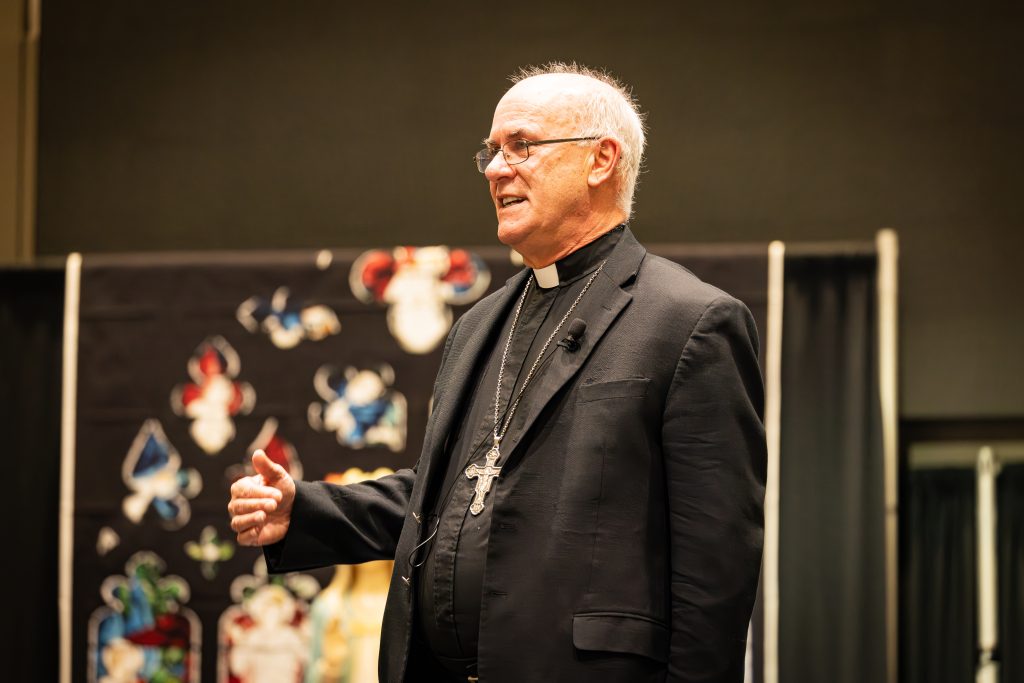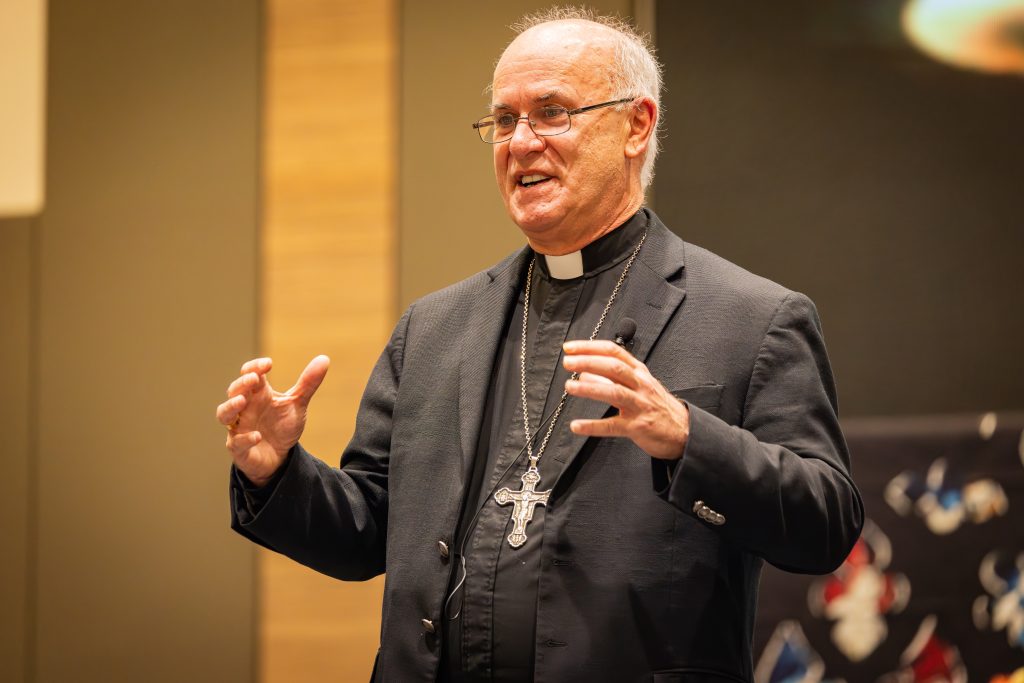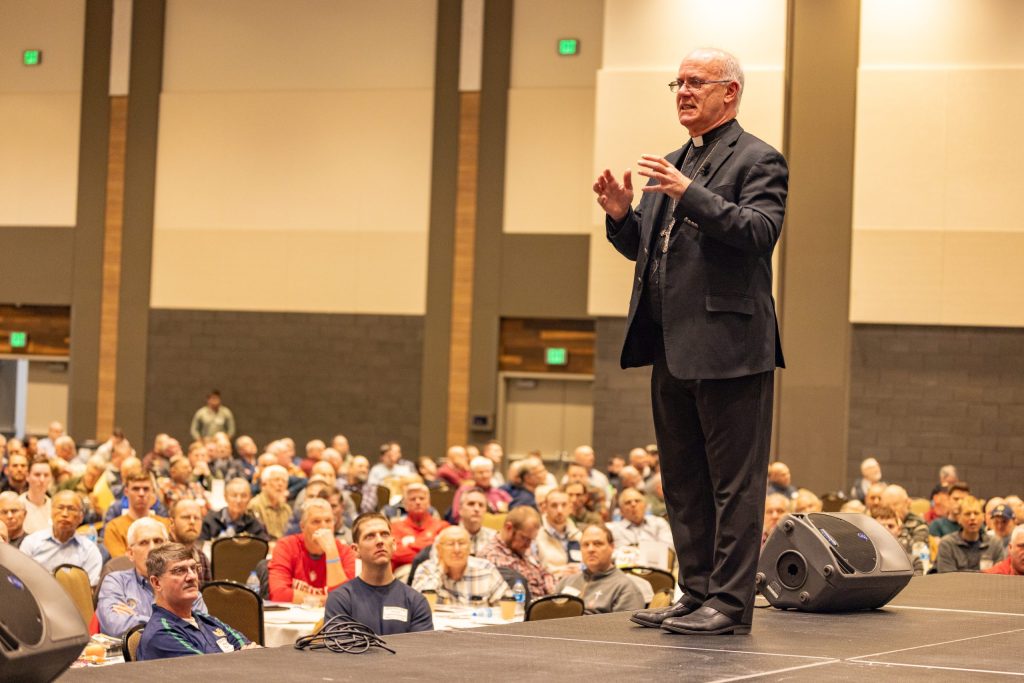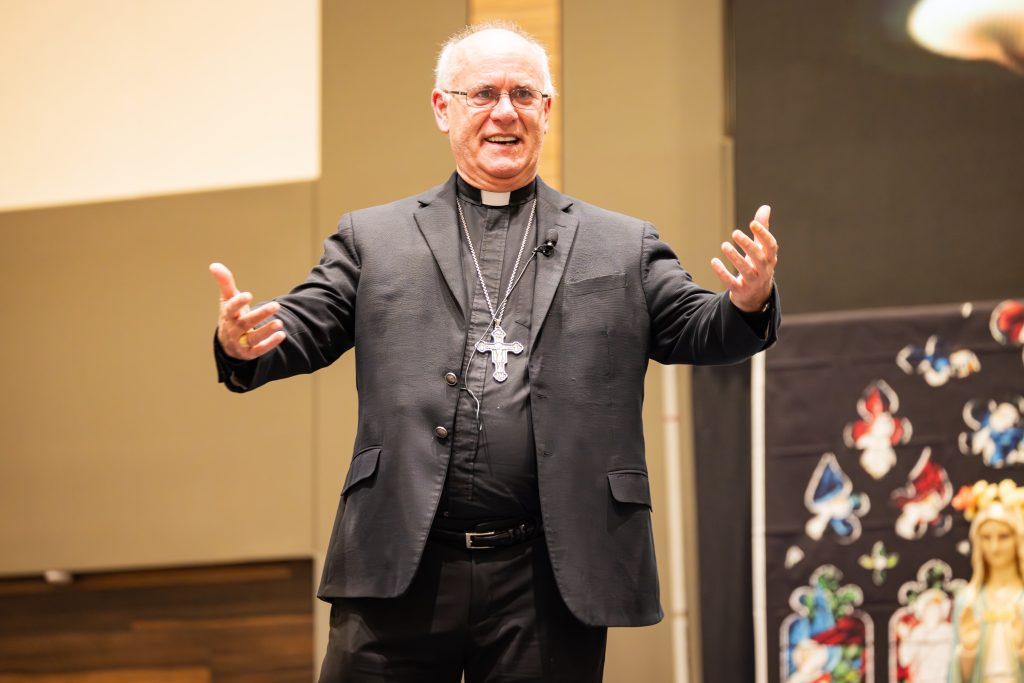March 7, 2024 // Bishop
Bishop Rhoades Speaks on Hot Topics at Rekindle the Fire
On Saturday, February 24, at Rekindle the Fire, the annual conference for Catholic men in the Diocese of Fort Wayne-South Bend, Bishop Rhoades came to the stage as the event’s fourth and final speaker for a question-and-answer session. With more than 800 men in attendance at the Memorial Coliseum Expo Hall in Fort Wayne, Bishop Rhoades fielded questions on some of the Church’s most talked about topics, including the National Eucharistic Congress, his thoughts as a delegate on the synod on synodality, the challenges he faced when he first became bishop of the Diocese of Fort Wayne-South Bend, the dangers of gender ideology, and the Vatican’s recent document allowing for the blessing of same-sex persons. The following recap of Bishop Rhoades’ Q&A has been edited for length and clarity.

Scott Warden
Bishop Rhoades answers questions during the Rekindle the Fire conference on Saturday, February 24, at the Memorial Coliseum Expo Hall in Fort Wayne.
Question: Can you talk about the ongoing National Eucharistic Revival and the upcoming National Eucharistic Congress? What do these events mean for the life of the Church in the United States and in our own diocese?
Bishop Rhoades: I’m on the leadership team and on the board for the National Eucharistic Congress in Indianapolis this coming July. I’ve already seen fruits of the National Eucharistic Revival here in our own diocese. I’ve seen fruits in various ways. A lot of parishes during this second year have small groups that are studying more about the doctrine and theology of the Eucharist. We’ve seen an increase in Mass attendance as well as Eucharistic adoration, especially at 40 Hours, which I required to be celebrated in all of our parishes this year. I really think this is bringing us many blessings. …
I’m really excited that this summer, the National Eucharistic Pilgrimages will take place – the four processions that will cover the whole United States, where the Blessed Sacrament will be carried in procession from California to Indianapolis, one from Brownsville, Texas, to Indianapolis, another one from New Haven, Connecticut, to Indianapolis, and then the one that will pass through our diocese, from Crookston, Minnesota, the source of the Mississippi River. … I really want to encourage you to check it out when the Blessed Sacrament will be in your area. And I want to encourage you to come out, and invite others to come out, to give witness to your faith by coming out to honor Our Lord, to adore Him in the Blessed Sacrament. I also want to encourage you to, if you can, to attend the National Eucharistic Congress. Hopefully we’ll have 80,000 people. We’ll be at the Lucas Oil Stadium. We’ll be using the Convention Center and other sites. If you can’t go there for the whole week, there are day passes that are available. There’ll be great speakers, beautiful liturgies every day, a lot of small-group gatherings. It’s going to be a really great event.
When I was a young man, I attended the International Eucharistic Congress in Philadelphia in 1976, and that had a real impact on me. The next year, I applied for the seminary. That’s the power of the Eucharist. I’ll never forget two of the people who I heard speak at the International Eucharistic Congress: Cardinal Karol Wojtyla, who became Pope John Paul II, and who is now a saint, and Mother Teresa of Calcutta, who is also a saint. They were both speakers at that Eucharistic Congress.
The Eucharist is the center of our life. I just want to encourage all of you to spread the message about this amazing, awesome gift of Our Lord, the gift of Himself in this sacrament of His love, His sacrifice that becomes present on the altar at every Mass, and His body broken for us, His blood poured out for us that we receive in Holy Communion, that strengthens us and nourishes us to live as His faithful disciples in the world today.
Question: Another topic close to your heart is the synod. How are you preparing to be faithful to Christ at the synod? There seems to be a lot of tension, so how are you seeking to remain faithful to Our Lord?
Bishop Rhoades: It was really tough to be away from the diocese for a whole month in October for the First Assembly of the 16th Assembly of the World Synod of Bishops. This was a rather unique assembly. It was the first time that the pope had laypeople there in a voting capacity. … But I was one of five bishops of the United States who were elected to represent the bishops of the United States. The pope appointed some additional U.S. bishops. There was a whole year of preparation for the synod because the Holy Father wanted a consultation of the faithful throughout the world, and I imagine some of you participated in the local consultations. All that was put into a diocesan report that went to the U.S. Conference of Catholic Bishops so that we had a national report. This was happening all over the world. All the national reports came together for continental assemblies, so there were continental reports, and then it all came to a summit with those of us, 350 or 400 of us, who were actually delegates at the synod. …
You may have seen the synthesis document from our October meeting. This year, that synthesis document is being reflected upon all over the world. We had a reflection by our Diocesan Pastoral Council just a couple of weeks ago on that final report. We’ll be gathering again in October; again, I’ll be gone for the whole month. This will be more crucial, because this is when we’ll make the concrete recommendations to Pope Francis regarding the whole idea of being a synodal Church.
What does that mean? It means that we are all on a journey as the People of God together, everyone – bishops, priests, deacons, religious, laypeople. All the baptized, all brothers and sisters in Christ, have a co-responsibility for the mission of the Church, the mission of evangelization, the mission of spreading the Kingdom of God. To try to encapsulate it, some of the principal themes that we’re looking at is how do we live this synodality? The three main topics were communion, participation, and mission.
Communion, the idea of the unity of the Church, is so foundational. Sadly, there are divisions. There are obviously those who are separated from the Catholic Church, going back to the Protestant Reformation 500 years ago or 1,000 years with the separation with the Orthodox. But we are all called to unity as the baptized. So, we are to walk in communion. One of the challenges we face today is polarization within the Catholic Church itself. That’s no surprise to any of us. We have the left and the right. We have political divisions that have kind of come into the Church as well. That’s not good for our mission, because if we’re divided, we’re less convincing examples in the world of the truth of the Christian faith. So, communion is really important.
Next is participation. I kind of talked a little bit about that, how everyone is called to participate. There shouldn’t be any idle members of the flock. When all of us were baptized and confirmed, it was for a mission. We were united to Christ. We received the gifts of the Holy Spirit. We became members of His body, the Church, and we’re called to live our faith, to spread the faith. We’re called to the mission of transforming the world with the Gospel of Christ. …
So, all of this is oriented toward mission. How do we do this? The pope feels that we need to have a much more synodal approach. And synods were part of the Church’s history from the beginning. In the early centuries of the Church, there were synods. But they were generally synods of bishops of a region who would get together to deal with issues in their particular regions of the world. But now, the pope wants to put more emphasis on the participation of the laity – or non-bishops, I should say – also priests, deacons, and religious consecrated men and women. And that’s where there’s some debate. How is this supposed to work? That’s the kind of stuff that we’re talking about. I think it’s important that we maintain and be careful about the distinction between the ministerial and the common priesthood, that we shouldn’t play down the necessity of the Sacrament of Holy Orders in the life of the Church. Obviously, Jesus chose apostles to lead the Church. We can’t do away with the distinction, otherwise it’s really a big problem. … Some of us are very concerned, and I’ve given my input on this issue at the synod.
The other thing I worry about is the sensus fidei. That term is bantered about a lot. … We understand or we know the word of God, which comes to us through Scripture and Tradition. Also, there is a certain instinct of the whole People of God for the truth of the faith, but we have to discern that very carefully, because it’s not like a majority opinion. Let’s say a majority of Catholics could be, for example, in our country, in favor of abortion rights. Well, maybe it’s like 52 percent or something. Well, the majority thinks this, so this must be what the Holy Spirit is saying. No. Pope Francis has said this is not a parliament. This is not an electoral body. This isn’t like Congress where the majority rules. But some of that is filtered into this, which makes me nervous, but some of us are speaking out against that. You can’t judge the truth by majority opinion. And that’s where the role of bishops comes in, and we have to remember the role of the magisterium. So, the sensus fidei, the idea of the sense of the faithful, has to be very carefully discerned. So where do we see, really, the truth coming through the faithful? We see it in those who are active in their faith, who are men and women of prayer – most especially the saints. They lived the truth in the Gospel. … Synodality can be a very good thing, but it has to be done correctly in continuity with the Tradition of the Church.
Question: When you were first appointed Bishop of Fort Wayne-South Bend, what was your biggest challenge?
Bishop Rhoades: I would say vocations. Vocations were very low when I got here, and I remember seeing those low numbers and thinking to myself, ‘Wow, if we don’t get the numbers up, we’re not going to have enough priests for all of our parishes. As you know, in some dioceses, for financial reasons and population movement, etc., a lot of parishes have been closed. And there was a plan when I got here for the merging and closing of parishes that Bishop D’Arcy had worked on. And when I received that plan, I thought, well, I’m going to put it on hold. Let’s see what we can do. Let’s pray hard and try to increase, by God’s grace, the number of priests so that all this won’t have to happen, unless necessary. … I think we’re in much better shape right now.
What would be some of the other challenges? At the beginning, I just had to get to know the diocese. I didn’t know anything about the diocese. You know, there were some challenges. We have Catholic colleges and universities that there were some challenges that I had to deal with – and still do – but to try to strengthen Catholic identity as much as I can, because I really don’t have authority over our institutions of Catholic higher education. They are not directly connected to the Church, to me, or to the diocese. …
Question: Someone wrote in to thank you for getting involved with the decision by Saint Mary’s College to allow transgender women into the school.
Bishop Rhoades: This is one of the biggest problems we face. Gender ideology and the rejection of Christian anthropology, I think, is one of the greatest challenges to the Church today in the West. … What I worry the most is the influence of this on our young people. This isn’t just an attack on masculinity. This is also an attack on femininity. This is an attack on the person, created male and female. This is saying no to God the creator, Pope Francis is saying. Now, we can distinguish this from those who genuinely struggle with gender dysphoria. We need to show love and care for those who are having a difficult time, for whatever reason, identifying with their God-given sex. We always should show compassion and love and give all the assistance we can. But that shouldn’t be equated to saying, “Oh, that’s OK, you’re having a difficult time, you can change and become the other sex.” … We bishops have been fighting the present administration because they’re trying to force us to do things like provide for these kinds of procedures in our Catholic hospitals and health care facilities. I’m the Chair of the U.S. bishops’ Committee on Religious Liberty. Believe me, this is one of the things on the top of our list. We’re being forced in our Catholic schools to address people by pronouns that they choose, and we’ve said no to that. What happens when we get sued?
We’re in this battle for our religious liberty. The underlying thing is this secularist, relativist culture that we live in. It’s no longer one that has the fundamentals of Christian anthropology. What is the human person, created body and soul? This body and soul is a unity. You can’t be a male body with a female soul. It’s impossible.
We also have to deal with this in the intellectual world, because in many of our colleges and universities, this is really not only taught, but you’re really excluded – you’re persecuted, discriminated against – if you don’t go along with it. Not only are you called a bigot … but they’re saying, well, the Church just isn’t up to date with the science. That is so false. When you look at biology, you look at science, even when they do some of these procedures, there’s not even proof that it really helps the psychological well-being of the person. We have increasing numbers who have transitioned, and now are trying to detransition, because they realize they were making a mistake.
Question: With the release of the Fiducia Supplicans, there has been a lot of confusion. How would you clarify that? How are we to understand the blessing of those persons who hold same-sex attraction?
Bishop Rhoades: For those who don’t know what Fiducia Supplicans is, this is the document from the Dicastery for the Doctrine of the Faith, which is led by Cardinal Fernandez, and it created a lot of confusion. The way the secular media presents it is that the Church is allowing blessing of same-sex marriages, which the document said, explicitly, the Church cannot, will not, bless same-sex marriages. But it did create confusion, because it talked about the blessing of homosexual couples. Now, probably two weeks after it was released, Cardinal Fernandez had to come out with a clarification, because a lot of us, especially us bishops, were like, what are you talking about?
There is no blessing allowed of homosexual unions. There cannot be a blessing, which is what the Congregation of the Doctrine of the Faith said two or three years ago. So, this document was very unfortunate, because it gave confusion to what was a clearer issue. Now, what did the pope and Cardinal Fernandez want here? This is where it gets confusing. They’re saying you can bless a homosexual couple but not the union. Well, we kind of scratch our heads and say, “OK, now what does that mean?” Clearly, we can’t say, “May God bless your union together,” because that union most likely is not just a friendship; it’s a sexual – homosexual – union.
Now, on the other hand, we can always bless persons. That’s never been a problem. A homosexual comes up and asks for a blessing – yes, of course. We’re all sinners. First of all, I wouldn’t even know if someone was homosexual or not. I kind of look at it like this: If a couple came up, I could bless them as individuals, but I would never do it in a way that would suggest that I was blessing their union. And that’s where it’s really problematic: in the sense that we have some countries where they are interpreting this as [being allowed to bless unions]. What bothers me, and many bishops in the United States and in Africa, is that Rome is not disciplining them. It came out in the clarification: You cannot bless unions. Well, then why … are the bishops in Germany and Belgium not reprimanded? That’s the problem I have with the whole thing. They clarified it, but then it’s going on. … But how do you have order in the Church if you have something going on in Germany and Belgium and they’re … turning a blind eye to it?
Here in the United States, most of us U.S. bishops are not doing that – and won’t do that. … So, we’re looked upon like we’re anti-Pope Francis. That’s the media narrative: The U.S. bishops are anti-Pope Francis, which isn’t true! But it would be good for us if we were supported by the Vatican more. That kind of hurts. We’re faithful to Rome. … I wish they never would have put out this document, because it just created what I would call unnecessary confusion.
The best news. Delivered to your inbox.
Subscribe to our mailing list today.









